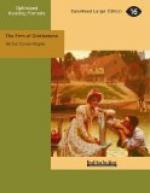“At this rate we’ll be there by to-morrow afternoon.”
“Thank you.”
The fisherman and his boy took turn and turn, one steering and the other keeping a look-out forward and trimming the sails. The two passengers crouched huddled together against the weather rail. They were each too occupied with thought to have time for speech. Suddenly, after passing Claxton and rounding the point, they came in full sight of the Priory, every window of which was blazing with light. They could see dark figures passing to and fro against the glare.
“Look there,” Girdlestone whispered.
“Ay, the police have not taken long,” his son answered. John Girdlestone was silent for some time. Then he suddenly dropped his face upon his hands, and sobbed hoarsely for the first and last time in his career.
“I am thinking of Monday in Fenchurch Street,” he said. “My God! is this the end of a life of hard work! Oh, my business, my business, that I built up myself! It will break my heart!”
And so through the long cold winter’s night they sat together while the boat ploughed its way down the English Channel. Who shall say what their thoughts were as they stared with pale, rigid faces into the darkness, while their minds, perhaps, peered even more cheerlessly into the dismal obscurity which lay over their future. Better be the lifeless wreck whom they have carried up to the Priory, than be torn as these men are torn, by the demons of fear and remorse and grief, and crushed down by the weight of a sin-stained and irrevocable past.
CHAPTER XLVII.
LAW AND ORDER.
The ruffian Burt was so horror-stricken at the sight of the girl whom he imagined that he had murdered, that he lay grovelling on the railway lines by the side of his victim, moaning with terror, and incapable of any resistance. He was promptly seized by the major’s party, and the Nihilist secured his hands with a handkerchief so quickly and effectively that it was clearly not the first time that he had performed the feat. He then calmly drew a very long and bright knife from the recesses of his frock-coat, and having pressed it against Burt’s nose to ensure his attention, he brandished it in front of him in a menacing way, as a hint that an attempt at escape might be dangerous.
“And who is dis?” asked Baumser, lifting up the dead woman’s head, and resting it upon his knee.
“Poor girl! She will niver spake again, whoever she may have been,” the major said, holding the lantern to her cold pale face. “Here’s where the cowards struck her. Death must have been instantaneous and painless. I could have sworn it was the young lady we came afther, if it were not that we have her safe down there, thank the Lord!”
“Vere are those oders?” asked Von Baumser, peering about through the darkness. “If dere is justice in de country, dey vill hang for the work of dis night.”




